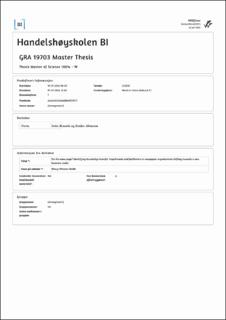On the same page? Identifying knowledge transfer impediments and facilitators in newspaper organizations shifting towards a new business model.
Master thesis
Permanent lenke
https://hdl.handle.net/11250/3037545Utgivelsesdato
2022Metadata
Vis full innførselSamlinger
- Master of Science [1621]
Sammendrag
Business model innovation (BMI) is an important means for firms to remain
competitive, and becomes particularly relevant in a rapidly changing environment
characterized by accelerating digitalization. However, few studies have investigated
the role of knowledge transfer in implementing new organizational structures
emerging from BMI. In knowledge-intensive firms, where the degree of autonomy is
high, knowledge management in the context of BMI might prove particularly
challenging as traditional forms of control are inadequate or only partly relevant.
Our research question is therefore: How do knowledge-intensive firms undertaking business model innovation successfully manage knowledge transfer from
new departments emerging from BMI processes to core production departments?
To answer our research question, we used grounded theory-building
techniques and conducted a multiple embedded case study in two large Norwegian
newspaper organizations, which we define as knowledge-intensive firms. Digital
disruption has forced both organizations to shift from an advertising-based revenue
model to a digital subscription-based model. The firms have in recent years
established so-called audience engagement teams (departments) to support
implementation of the new business model. By identifying the facilitators and
potential impediments of knowledge transfer in this context, we demonstrate a best
practice for how knowledge-intensive firms can remain competitive through business
model innovation. Our empirical setting is ideal to explore these mechanisms,
because the digital disruption of the newspaper industry has rendered its former
business models inadequate. Successful implementation of the new business model is
dependent on the transfer of knowledge from the audience engagement teams to the
newsrooms, which are the organizations core production departments.
Our findings provide a novel perspective on how knowledge management supports the implementation of new organizational structures emerging from BMI, which is a feature often recognized in industries disrupted by digitalization. We found that successful knowledge transfer rests upon two dimensions: (1) sensemaking and (2) organizational capabilities. Given the high degree of autonomy in newsrooms, establishing a shared meaning across departments is crucial for facilitating knowledge transfer. We found that newsroom managers are key players in achieving shared meaning, because they enjoy a high level of authority in their own departments while acting as a «bridge» between newsrooms and audience engagement teams. Newsroom managers are moreover crucial in incorporating knowledge in the newsroom’s routines: This effort reinforces shared meaning, as well as securing sustained assimilation and application of knowledge. Additionally, by signaling an active approach to the application of insight, newsroom managers preserve the newsrooms sense of autonomy, which is a prerequisite for knowledge transfer. Finally, we found that audience engagement teams promote knowledge transfer by adapting knowledge to newsrooms local environment.
Beskrivelse
Masteroppgave(MSc) in Master of Science in Business, Strategy - Handelshøyskolen BI, 2022
